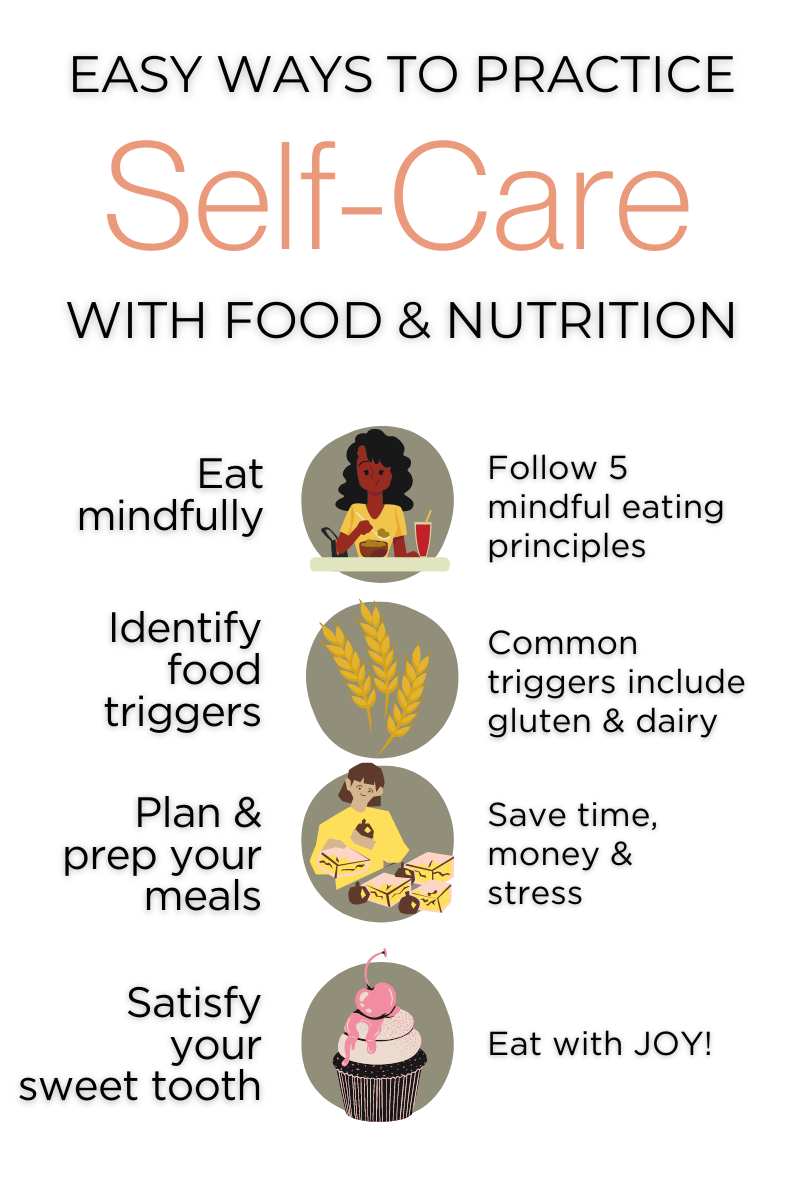
When you think of self-care, a few things may come to mind. You may think of meditating or yoga class, soaking in a hot Epsom salt bath, treating yourself to a deep tissue massage. Or maybe lounging on the couch with a good book and a warm cup of chamomile is your preferred self-care practice. That’s great, too! These are all great self-care ideas, and there’s really no right or wrong way to care for your physical, mental, and emotional well-being.
That said, there is a lesser-known self-care practice I’d like to highlight today: nourishing your body and mind through food and nutrition! The food you eat plays a major role in how you think, feel, behave, and function, so healthy eating could be one of the most overlooked — yet vital — forms of self-care. Let me explain…
What It Means to Practice Self-Care Through Food
By healthy eating, I don’t just mean filling your plate with lots of colorful veggies, whole grains, and leafy greens. I’m also talking about how you eat: are you chewing your food enough? Are you focused on what you’re eating as you eat it, or are you scrolling through Instagram or watching Netflix? Are you eating with joy and treating yourself with love and kindness rather than criticizing yourself for eating foods you “shouldn’t” be eating?
To truly nourish your body, mind, and spirit through the food you eat, I encourage you to practice mindful eating: a judgment-free mindfulness technique that involves five basic principles:
- Thoroughly chewing your food to improve digestion, engage the senses, and reduce energy intake
- Assessing hunger and fullness to determine when it’s best for you to start and stop eating
- Reducing portion sizes and using smaller dishes to prevent overeating
- Eliminating distractions at mealtimes to better control food intake and focus on how food makes you feel
- Appreciating the food you’re eating without judgment, and savoring its appearance, smell, taste, and texture
By incorporating these five mindful eating principles into your mealtimes — even if you’re mindful for just one meal a day — you’ll likely eat less, maintain a healthy weight, and experience more satisfaction from the foods you eat. And by listening to your body, mindful eating can help you to make better food choices in the future, too.

Other Benefits of Mindful Eating
In addition to building self-compassion, supporting a healthy weight, and improving eating habits overall, mindful eating has been linked to enhanced digestive function and gut health — particularly among those with digestive disorders like chronic indigestion and irritable bowel syndrome (IBS). Self-care practices such as mindful eating improve these digestive disorders by activating the body’s parasympathetic nervous system, helping to promote relaxation, reduce stress, and support the digestive process. I call this the “rest and digest” state.
As you may already know, good digestive health is crucial so your body can break down, use, and store the vitamins and nutrients you consume. So along with eating more mindfully, try adding a few of my favorite gut-friendly foods into each day to really boost your digestion!
Other Self-Care Ideas for Improved Diet & Nutrition
Mindful eating is a fabulous self-care strategy for improving your eating habits and overall health and wellness, but it isn’t the only way to care for yourself through food. As I mentioned earlier, there is really no right or wrong way to care for your body and mind — and there isn’t a one-size-fits all self-care practice!
Here are a few other self-care ideas for better health and nutrition:
- Eat foods that make you feel good. My Nourish 21 program can help you to uncover the foods that make you feel great — and the ones that trigger inflammation or symptoms like gas, bloating, and brain fog.
- Plan your meals. To ensure you’re eating nutrient-rich foods at every meal, try planning and prepping your meals each week. You’ll save money, reduce stress throughout the week, and have more time for you!
- Satisfy your sweet tooth. Sometimes practicing self-care means indulging in a sweet treat, and I’m all for that! I recommend whipping up a batch of my Walnut Butter Brownie Bites or Seedy Chocolate Bark.
Food plays a HUGE role in our lives, and practicing self-care through nutrition can help us build a healthy relationship with the food we eat while also reducing stress and improving our physical, mental, and emotional wellness.
Self-care can mean many different things, but practicing mindful eating, consuming the foods that make you feel good (and avoiding the ones that don’t), planning and prepping your meals each week, and satisfying your sweet tooth are great places to start.
Ready to learn more about self-care and nutrition? Get on the waitlist for my Nourish 21 program! You’ll gain access to 21 days of delicious recipes and meal plans, plus receive an easy-to-follow guidebook that highlights the ins-and-outs of the program.